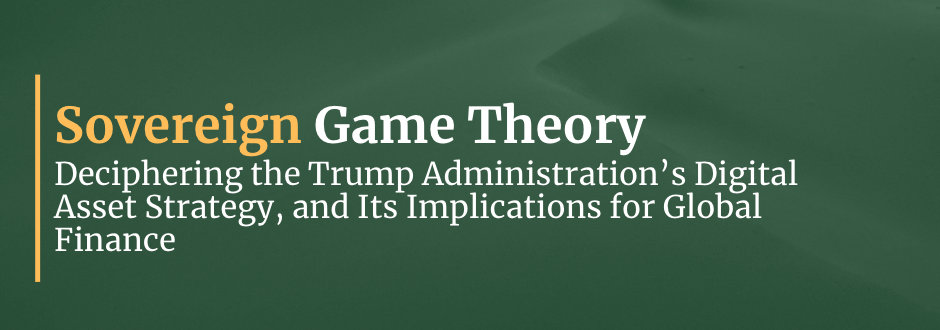- The Bitcoin Observer
- Posts
- Institutions Adopted Bitcoin. Are Nation-States Next?
Institutions Adopted Bitcoin. Are Nation-States Next?
Bitcoin Insights For Professionals

Institutions Have Arrived. Who Moves Next?
Bitcoin ETFs have unlocked institutional capital, with billions flowing in from hedge funds, pension funds, and asset managers. But as Wall Street firms secure their positions, a bigger question emerges:
Will nation-states be next?
The sovereign game theory of Bitcoin suggests that once one nation adopts Bitcoin, others must follow to remain competitive. Could 2025 be the year central banks, sovereign wealth funds, and emerging economies enter the game?
Let’s break it down.
This Month’s Big Story: Sovereign Game Theory & Bitcoin
With institutions adopting Bitcoin at scale in 2024, the next logical question is: will nation-states follow in 2025?
History suggests that once a competitive advantage is recognized, others must act to maintain their positioning. This is the core of Sovereign Game Theory—the idea that as one nation accumulates Bitcoin, others are incentivized to do the same to strengthen their financial and geopolitical standing.
Key Insights from Our Latest Report:
U.S. Government Now Holds Over 213,000 BTC – but will it become an intentional strategy?
China and Russia Are Moving Toward “Outside Money” – increasing gold reserves and exploring Bitcoin.
The Geopolitical Game is Underway – sanctions, reserve currency competition, and the shift from “inside money” to Bitcoin as a neutral reserve asset.
Will 2025 Be the Year of Nation-State Accumulation? – the game theory suggests it’s inevitable.
“Bitcoin is no longer just a hedge for individuals and institutions—it’s becoming a tool for nations navigating a shifting global financial order.”
Read the full report on Sovereign Game Theory here.
Market Snapshot
Key Bitcoin Metrics as of January 31 2025:
Dominance: 57.75%
Price: 102,411.26 USD
Market Capitalization: 2.03 Trillion USD
All-Time-High: 109,088.75 USD
Who Holds Bitcoin?
Sovereign Bitcoin Reserves:
🇺🇸 United States: 213,246 BTC (1.02% of total supply)
🇨🇳 China: 190,000 BTC (0.91% of total supply)
🇬🇧 United Kingdom: 61,000 BTC (0.29% of total supply)
🇺🇦 Ukraine: 46,351 BTC (0.22% of total supply)
Corporate Bitcoin Treasuries:
MicroStrategy: 471,107 BTC (2.65% of total supply)
Block.one: 164,000 BTC (0.78% of total supply)
Marathon Digital Holdings: 40,435 BTC (0.19% of total supply)
Tesla: 9,720 BTC (0.05% of total supply)
Bitcoin Fundamentals: Why Would a Nation Hold Bitcoin?
For the first time in history, nation-states are considering Bitcoin as a reserve asset—but what makes it appealing to sovereigns?
Unseizable Wealth: Unlike foreign currency reserves (which can be frozen), Bitcoin is permissionless.
Scarcity & Store of Value: With only 21 million BTC ever to exist, Bitcoin offers a finite alternative to money printing and inflation.
Geopolitical Leverage: Emerging markets looking to bypass USD dependence are eyeing neutral reserve assets like gold and Bitcoin.
Energy-Backed Money: Countries with surplus energy (such as the Middle East) could mine Bitcoin as a monetary hedge while monetizing unused resources.
“Bitcoin is the only reserve asset in history that can be self-custodied by a nation without reliance on foreign intermediaries.”
Closing Thought
Institutions have arrived—will nation-states be next?
The Sovereign Game Theory of Bitcoin suggests that as one country moves, others must follow. 2025 could be the year we see the first major sovereign wealth funds and central banks making a move into Bitcoin.
We’ll be tracking these developments closely in the coming months.
What do you think? Will we see a nation-state openly accumulate Bitcoin in 2025? Reply to this email or share your thoughts on LinkedIn / X.
Want to discuss how Bitcoin fits into your strategy?
Connect with the Onramp MENA team or book a consultation to learn more about Bitcoin and custody solutions.

